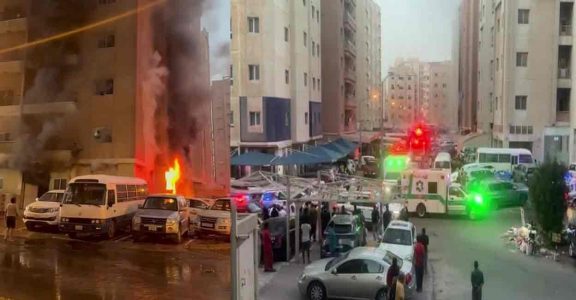The devastating fire that swept through a multi-storey building in Kuwait’s Mangaf area on June 12, claiming the lives of at least 49 individuals, predominantly Indian nationals, and injuring over 50 others, is a stark reminder of the precarious conditions faced by migrant workers in the Gulf region. This tragic incident not only highlights the urgent need for stringent safety regulations but also underscores the broader issues of exploitation and negligence that migrant workers endure daily. The speed and ferocity of the blaze, combined with the timing-early morning when most residents were asleep-resulted in a high death toll due to smoke inhalation. Authorities have initiated investigations to determine the cause of the fire and identify those responsible. The Emir of Kuwait has ordered a thorough probe and promised accountability. In a significant move, several high-ranking municipal officials have been suspended, reflecting the gravity with which the Kuwaiti Government is treating this incident.
While the immediate cause of the fire is under investigation, initial reports point to gross negligence in terms of building safety standards. The overcrowded conditions in the building, housing 195 individuals, and the blocked ground passages exacerbated the situation, preventing a swift evacuation. This incident sheds light on a systemic issue where migrant workers are often crammed into inadequate housing facilities, reflecting a disregard for their safety and well-being. The NBTC group, which rented the building, along with the property owner and the janitor, are under scrutiny. The fire underscores the urgent need for better regulatory oversight and enforcement of safety standards in worker accommodations. Building owners and employers must adhere to strict safety protocols to prevent such tragedies in the future.
Migrant workers, particularly those from South Asia, form a significant portion of the workforce in Kuwait and other Gulf countries. Indians alone constitute 21% of Kuwait’s population and 30% of its workforce. These workers often take up low-paying, labour-intensive jobs under harsh conditions, driven by the promise of better earnings to support their families back home. However, their living and working conditions frequently fall short of basic standards, exposing them to exploitation and hazards.
The Kuwaiti Government’s response to this incident, including the immediate suspension of officials and the promise of accountability, is commendable. However, it must be followed by long-term reforms. Ensuring the safety and dignity of migrant workers requires comprehensive measures, including regular inspections of worker accommodations, stringent enforcement of safety regulations and harsh penalties for violations.
The Indian Government has been proactive in responding to the crisis. The Indian Embassy in Kuwait has set up an emergency helpline and is actively involved in providing support to the affected workers and their families. This includes overseeing the treatment of the injured and facilitating the repatriation of the deceased’s remains. The presence of MoS EAM emphasises the seriousness with which India views this tragedy. Such diplomatic efforts are crucial in ensuring that the victims receive justice and that measures are taken to prevent future incidents.
While immediate relief and support are vital, there is a pressing need for comprehensive reforms to address the underlying issues faced by migrant workers. The Kuwaiti Government must ensure that all worker accommodations meet international safety standards. Regular audits and stringent enforcement of these standards are necessary to protect the lives of these vulnerable workers. Moreover, both the sending and receiving countries need to collaborate to create better frameworks for the protection of migrant workers. This includes fair contracts, decent working conditions, and adequate living facilities. The international community also has a role to play in advocating for the rights and safety of migrant workers and pushing for policies that prioritise their well-being. Ensuring their protection is not just a legal obligation but a moral imperative. The lives lost in this tragic incident should galvanise efforts towards creating a safer, fairer environment for all migrant workers.


